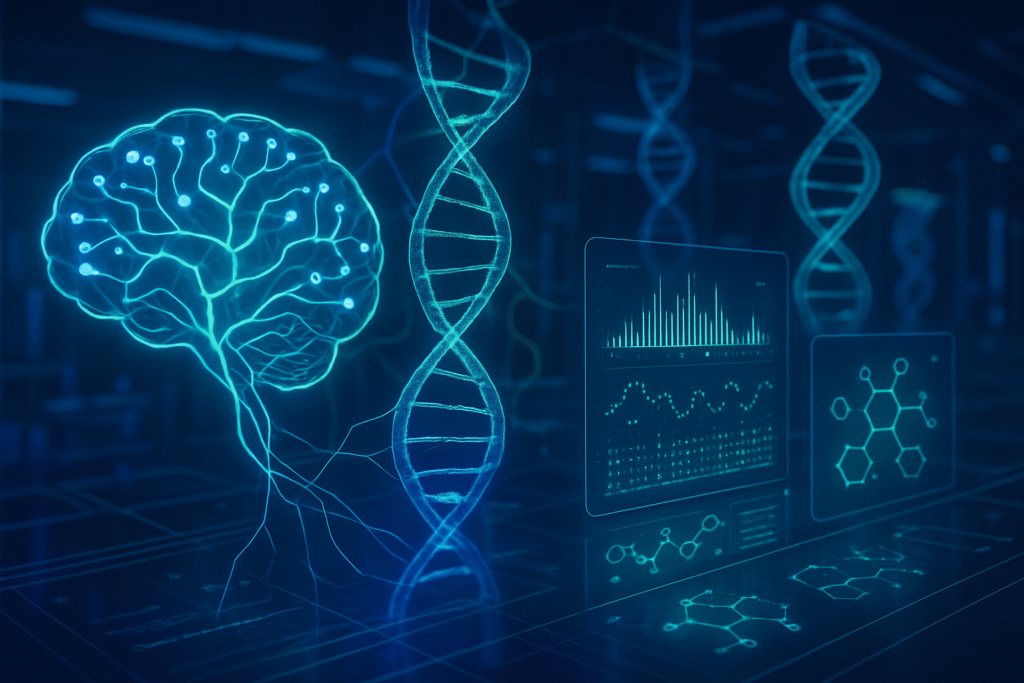
In a landmark move signaling the accelerating convergence of artificial intelligence and pharmaceutical research, AstraZeneca (LSE: AZN) has forged a multi-target research collaboration with Algen Biotechnologies, an AI-driven functional genomics company, in a deal potentially worth up to US$555 million. Announced in October 2025, this strategic partnership aims to leverage Algen's cutting-edge AI platform to discover and commercialize novel immunology therapies, underscoring the pharmaceutical industry's growing reliance on AI to transform drug discovery and development.
The collaboration represents a significant validation for AI's role in identifying new biological insights and therapeutic targets, particularly in complex disease areas like chronic inflammatory conditions. For AstraZeneca, it enhances its already robust AI-driven R&D pipeline, while for Algen Biotechnologies, it provides substantial financial backing and the opportunity to translate its innovative AI-discovered programs into potential clinical realities, solidifying its position at the forefront of AI-powered biotech.
Unpacking AlgenBrain : AI-Powered Functional Genomics for Causal Biology
: AI-Powered Functional Genomics for Causal Biology
At the heart of this transformative partnership is Algen Biotechnologies' proprietary "AlgenBrain " platform. This sophisticated system integrates advanced computational models with scalable, single-cell experimental systems, offering a paradigm shift in how therapeutic targets are identified. AlgenBrain
" platform. This sophisticated system integrates advanced computational models with scalable, single-cell experimental systems, offering a paradigm shift in how therapeutic targets are identified. AlgenBrain operates on a "biology-first, data-driven" principle, aiming to reverse-engineer disease trajectories through a continuous learning loop that combines experimental biology with AI.
operates on a "biology-first, data-driven" principle, aiming to reverse-engineer disease trajectories through a continuous learning loop that combines experimental biology with AI.
Technically, AlgenBrain excels by capturing billions of dynamic RNA changes within human, disease-relevant cell types. It then links these RNA changes to functional outcomes and therapeutic indices using high-throughput gene modulation, powered by its proprietary "AlgenCRISPR
excels by capturing billions of dynamic RNA changes within human, disease-relevant cell types. It then links these RNA changes to functional outcomes and therapeutic indices using high-throughput gene modulation, powered by its proprietary "AlgenCRISPR " system. AlgenCRISPR
" system. AlgenCRISPR enables precise and fine-tuned gene modulation at an industrial scale, allowing the platform to decode complex biology at a single-cell level. Through deep learning models built on these vast datasets, AlgenBrain
enables precise and fine-tuned gene modulation at an industrial scale, allowing the platform to decode complex biology at a single-cell level. Through deep learning models built on these vast datasets, AlgenBrain maps causal links between gene regulation and disease progression, identifying novel genes that, when therapeutically targeted, possess the potential to reverse disease processes. This focus on causal biology, rather than mere correlation, is a crucial differentiator from many previous approaches.
maps causal links between gene regulation and disease progression, identifying novel genes that, when therapeutically targeted, possess the potential to reverse disease processes. This focus on causal biology, rather than mere correlation, is a crucial differentiator from many previous approaches.
Traditional drug discovery often relies on less precise methods, crude phenotypes, or labor-intensive target prioritization without direct biological validation, leading to lengthy timelines (10-15 years) and high failure rates. AlgenBrain 's approach dramatically speeds up preclinical discovery and aims to improve translational accuracy, thereby increasing the probability of clinical success. The integration of advanced CRISPR technology with deep learning allows for rapid, scaled decoding of cellular networks and the identification of effective intervention points, moving beyond simply predicting protein structures to understanding and modulating complex molecular interactions. Initial reactions from the industry, particularly highlighted by AstraZeneca's substantial investment and the company's spin-out from Nobel Laureate Jennifer Doudna's lab at UC Berkeley, indicate strong confidence in AlgenBrain
's approach dramatically speeds up preclinical discovery and aims to improve translational accuracy, thereby increasing the probability of clinical success. The integration of advanced CRISPR technology with deep learning allows for rapid, scaled decoding of cellular networks and the identification of effective intervention points, moving beyond simply predicting protein structures to understanding and modulating complex molecular interactions. Initial reactions from the industry, particularly highlighted by AstraZeneca's substantial investment and the company's spin-out from Nobel Laureate Jennifer Doudna's lab at UC Berkeley, indicate strong confidence in AlgenBrain 's potential to deliver on these promises.
's potential to deliver on these promises.
Reshaping the AI and Pharma Landscape: Competitive Dynamics and Disruptions
The AstraZeneca-Algen Biotechnologies deal sends a powerful signal across the AI drug discovery landscape, with significant implications for other AI companies, tech giants, and startups. This multi-million dollar commitment from a pharmaceutical behemoth serves as a strong validation for the entire sector, likely spurring increased venture capital and corporate investment into innovative AI-driven biotech startups. Companies specializing in functional genomics, single-cell analysis, and AI-driven causal inference – much like Algen – are poised to see heightened interest and funding.
The deal also intensifies pressure on other pharmaceutical giants to accelerate their own AI adoption strategies. Many, including AstraZeneca (LSE: AZN) itself, are already heavily invested, with partnerships spanning companies like CSPC Pharmaceuticals (HKG: 1093), Tempus AI, Pathos AI, Turbine, and BenevolentAI (LSE: BENE). Those that lag in integrating AI risk falling behind in identifying novel targets, optimizing drug candidates, and reducing crucial R&D timelines and costs. Tech giants like Alphabet (NASDAQ: GOOGL), Microsoft (NASDAQ: MSFT), and Amazon (NASDAQ: AMZN), which provide foundational cloud computing, advanced machine learning tools, and data analytics platforms, stand to benefit from the increased demand for their services within the pharmaceutical sector. Their scalable computing resources are indispensable for processing the vast biological datasets required for AI drug discovery.
Potential disruptions to existing products and services are manifold. AI's ability to identify targets and optimize drug candidates more rapidly can significantly shorten the drug discovery phase, potentially bringing new therapies to patients faster. This can lead to higher success rates and reduced costs, mitigating the exorbitant expenditures and high failure rates of traditional R&D. Furthermore, AI-driven insights into disease mechanisms are paving the way for more personalized and targeted therapies, shifting away from a "one-size-fits-all" approach. Traditional, largely wet-lab-based R&D models may be augmented or partially replaced by AI-driven computational methods, necessitating workforce reskilling and resource reallocation. For AstraZeneca, this deal solidifies its market positioning as a leader in AI-driven drug discovery, securing a strategic advantage in potentially high-value therapeutic areas. For Algen Biotechnologies, the partnership provides critical validation, substantial financial backing, and access to AstraZeneca's deep expertise in translational science and clinical development, establishing Algen as a key innovator at the intersection of CRISPR and AI.
Wider Significance: AI's Broad Impact on Pharma, Healthcare, and Society
The AstraZeneca-Algen Biotechnologies collaboration is more than just a corporate deal; it's a significant indicator of the broader AI landscape and its transformative impact on the pharmaceutical industry, healthcare, and society. This partnership exemplifies a pivotal shift towards data-driven, biology-first approaches in drug discovery, driven by AI's unparalleled ability to process and interpret vast, complex biological and chemical datasets. Facing escalating R&D costs, lengthy timelines, and persistently low success rates in traditional drug development, pharmaceutical companies are increasingly embracing AI to accelerate discovery, enhance preclinical development, streamline clinical trials, and facilitate drug repurposing.
The broader impacts are profound: for the pharmaceutical industry, it promises dramatically increased efficiency, reduced costs, and higher success rates in bringing new drugs to market, thereby maximizing the effective patent life of novel therapies. In healthcare, this translates to faster delivery of life-saving treatments and improved patient outcomes, particularly through the advancement of precision medicine where treatments are tailored to an individual's unique genetic and biological profile. Societally, the benefits include addressing unmet medical needs and improving global health, with potentially reduced R&D costs contributing to greater accessibility and affordability of healthcare.
However, this rapid integration of AI also raises critical concerns. Algorithmic bias, if not carefully managed, could exacerbate existing health disparities. The "black box" nature of some AI systems poses challenges for transparency and explainability, hindering regulatory approval and eroding trust. Data privacy and security are paramount, given the reliance on vast amounts of sensitive patient data. Ethical dilemmas arise concerning accountability for AI-driven decisions and intellectual property ownership when AI autonomously designs molecules. Regulatory bodies are actively working to develop frameworks to address these complexities, ensuring responsible AI deployment.
This deal builds upon a decade-long trajectory of increasing AI sophistication in drug discovery. While early AI applications in the 20th century were rudimentary, the 2010s saw widespread adoption driven by advances in big data, deep learning, genomics, and high-throughput screening. Milestones like Insilico Medicine's rapid prediction of a molecule for a specific target in 2019, Deep Genomics' "AI-discovered therapeutic candidate," BenevolentAI's quick identification of a COVID-19 treatment, and DeepMind's AlphaFold breakthrough in protein structure prediction have paved the way. The AstraZeneca-Algen deal, with its focus on combining AI with CRISPR-based gene modulation for novel target generation, represents a convergence of these powerful technologies, pushing the boundaries of what AI can achieve in decoding and intervening in complex biological processes.
The Horizon: Future Developments in AI-Driven Drug Discovery
The AstraZeneca-Algen Biotechnologies partnership is a harbinger of significant future developments in AI-driven drug discovery. In the near term (1-5 years), AI is expected to further accelerate hit identification and lead optimization, cutting initial drug discovery phases by 1-2 years and potentially reducing design efforts by 70%. Improved prediction of drug efficacy and toxicity will reduce costly late-stage failures, while AI will streamline clinical trials through predictive analytics for patient selection, optimizing protocols, and real-time monitoring, potentially reducing trial duration by 15-30%. The industry will likely witness an increased number of collaborations between pharma giants and AI specialists, with an estimated 30% of new drugs expected to be discovered using AI by 2025.
Looking further ahead (5-10+ years), experts predict AI will facilitate the development of "life-changing, game-changing drugs," enabling scientists to "invent new biology" – designing novel biological entities that do not exist in nature. Highly personalized medicine, where treatments are tailored to an individual's unique genetic and biological profile, will become more commonplace. The emergence of autonomous discovery pipelines, capable of generating viable molecules for a high percentage of targets, and AI-powered "co-scientists" that can generate novel hypotheses and experimental protocols, are on the horizon. The integration of AI with other cutting-edge technologies like quantum computing and synthetic biology promises even faster and more personalized drug discovery.
However, several challenges must be addressed for these developments to fully materialize. Data availability, quality, and bias remain critical hurdles, as AI models demand vast amounts of high-quality, consistent, and unbiased data. The lack of transparency and interpretability in many AI models, often termed "black boxes," can hinder trust, validation, and regulatory approval. Regulatory and ethical considerations, including data privacy, fairness, and accountability, require robust frameworks to keep pace with rapid AI advancements. The inherent complexity of biological systems and the need for seamless interdisciplinary collaboration between AI experts, biologists, and chemists are also crucial for successful integration. Experts widely agree that AI will serve as an indispensable tool, enhancing human intelligence and scientific capabilities rather than replacing researchers, with the global AI in pharma market projected to reach approximately US$16.5 billion by 2034.
A New Era of Predictive and Precision Medicine: A Comprehensive Wrap-up
The AstraZeneca (LSE: AZN) and Algen Biotechnologies deal, valued at up to US$555 million, stands as a pivotal moment in the ongoing narrative of AI's integration into pharmaceutical R&D. It underscores a strategic imperative for global pharmaceutical leaders to embrace cutting-edge AI platforms to accelerate the discovery of novel therapeutic targets, particularly in challenging areas like immunology. By leveraging Algen's "AlgenBrain " platform, which combines advanced CRISPR gene modulation with AI-driven functional genomics, AstraZeneca aims to decode complex chronic inflammatory conditions and bring more effective, precise therapies to patients faster.
" platform, which combines advanced CRISPR gene modulation with AI-driven functional genomics, AstraZeneca aims to decode complex chronic inflammatory conditions and bring more effective, precise therapies to patients faster.
This collaboration is a key takeaway, highlighting the industry's shift towards data-driven, "biology-first" approaches. It further solidifies AstraZeneca's position as an early and aggressive adopter of AI, complementing its existing network of AI partnerships. In the broader context of AI history, this deal signifies the maturation of AI from a supplementary tool to a central driver in drug discovery, validating AI-driven functional genomics as a robust pathway for preclinical development.
The long-term impact promises a fundamental reshaping of how medicines are discovered and delivered. By dramatically improving the efficiency, success rates, and precision of drug development, AI has the potential to lower costs, shorten timelines, and usher in an era of truly personalized medicine. The focus on uncovering causal links in disease progression will likely lead to breakthrough treatments for previously intractable conditions.
In the coming weeks and months, observers should closely watch for any early-stage progress from the AstraZeneca-Algen collaboration, such as the identification of novel immunology targets. Expect a continued surge in strategic partnerships between pharmaceutical giants and specialized AI biotechs, further fueling the projected substantial growth of the AI-based drug discovery market. Advancements in generative AI and multimodal models, along with the increasing application of AI in clinical trial optimization and the integration of real-world data, will be critical trends to monitor. Finally, the evolution of regulatory frameworks to accommodate AI-discovered and AI-developed drugs will be crucial as these novel therapies move closer to market. This partnership is a clear indicator that AI is not just a tool, but an indispensable partner in the future of healthcare.
This content is intended for informational purposes only and represents analysis of current AI developments.
TokenRing AI delivers enterprise-grade solutions for multi-agent AI workflow orchestration, AI-powered development tools, and seamless remote collaboration platforms.
For more information, visit https://www.tokenring.ai/






